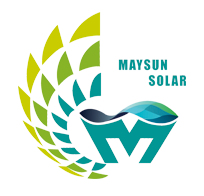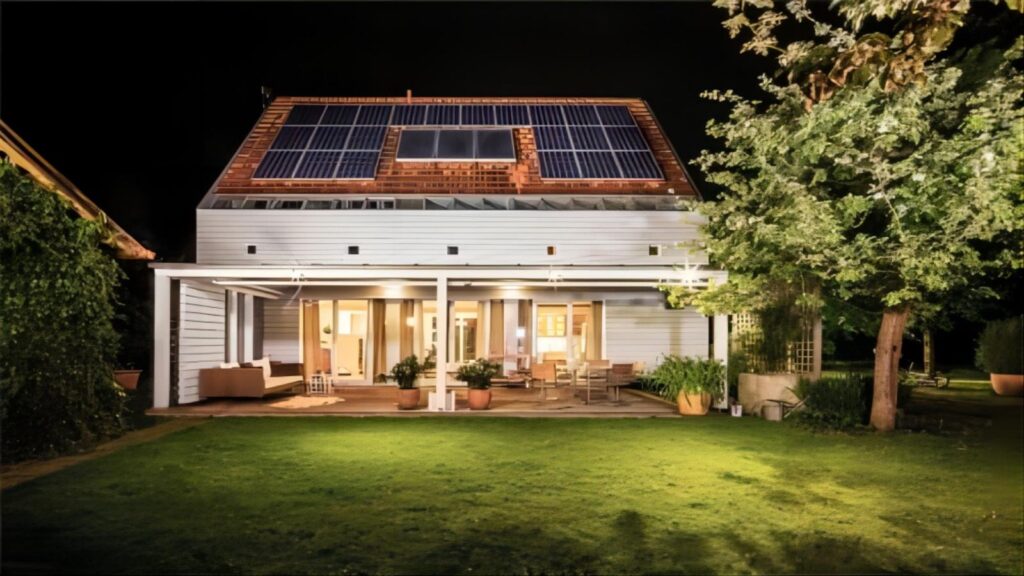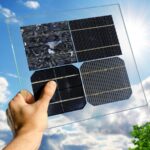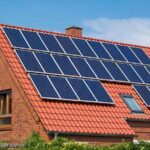Table of Contents
What is a home energy storage system?
A home energy storage system is a new type of hybrid system that combines a battery, hybrid inverter, and photovoltaic panels with a lithium battery to store power on top of a traditional grid-connected photovoltaic power system.
It is used for storing renewable energy sources such as solar and wind energy. It can store the electricity obtained through photovoltaic power generation and wind power generation, etc. and release it for household use when needed.
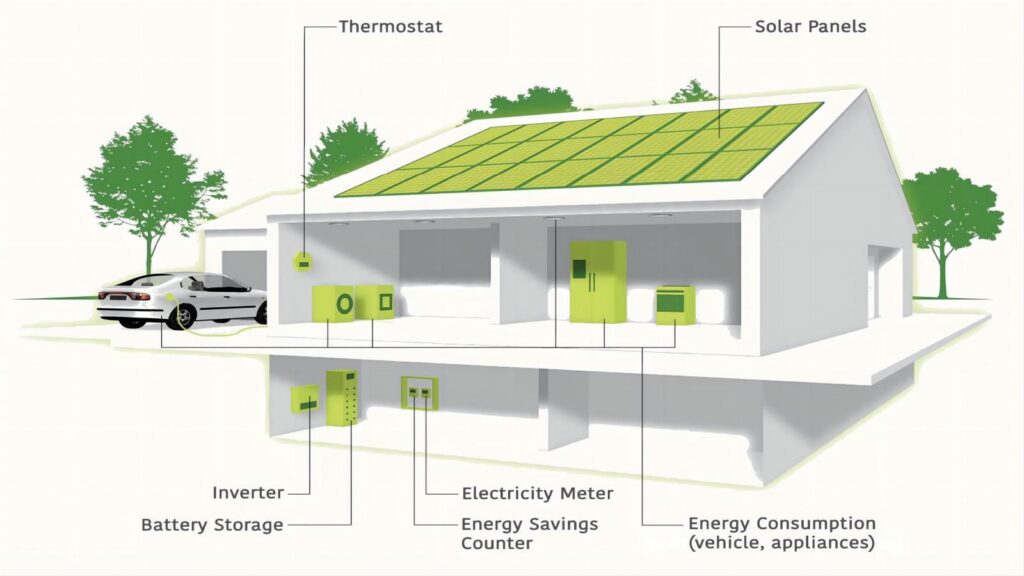
In what fields can home energy storage system be applied?
1.Home photovoltaic power generation system: PV home energy storage system can be used in conjunction with home photovoltaic power generation system to store the electricity generated by solar energy during the day and use it at night or in the dark.
- Wind power generation system: PV home energy storage system can be used in conjunction with wind power generation system to store the electricity obtained through wind turbine power generation for home use.
- Emergency Backup Power: PV home energy storage systems can be used as an emergency backup power source for the home, providing the necessary power support in the event of a grid failure or power outage.
What are the system types and characteristics of home solar + energy storage?
- Hybrid household PV + energy storage system
Hybrid PV + energy storage system generally consists of PV modules, Li-ion batteries, hybrid inverter, smart meter, CT, grid, on-grid loads and off-grid loads. The system can realize PV charging the battery directly by DC-DC conversion, and can also realize bi-directional DC-AC conversion for battery charging and discharging.
2. Coupled home PV + energy storage system
Coupled PV + energy storage system, also known as AC retrofit PV + energy storage system, the system generally consists of PV modules, grid-connected inverter, lithium batteries, AC-coupled storage inverter, smart meter, CT, grid, grid-connected loads and off-grid loads. This system can realize that after the PV is converted to AC power by the grid-connected inverter, the excess power will be converted to DC power and stored in the battery by the AC-coupled energy storage inverter.
3. Off-the-grid type household PV+energy storage system
Off-grid home PV + energy storage system generally consists of PV modules, lithium batteries, off-grid energy storage inverters, loads and diesel generators. The system can realize PV charging directly to the battery by DC-DC conversion, and can also realize bidirectional DC-AC conversion for battery charging and discharging.
4. Photovoltaic energy storage energy management system
Photovoltaic energy storage energy management system, the system generally consists of photovoltaic modules, grid-connected inverters, lithium batteries, AC-coupled energy storage inverters, smart meters, CT, grid and control system. The control system can receive and respond to external commands, respond to the system’s electricity demand, accept the system’s real-time control and scheduling, and can participate in the optimal operation of the power grid, making the use of electricity more efficient and economical.
How to integrate a home solar energy storage system?
- Battery type: choosing the right type of battery is the first step in the configuration. The more widely used battery types on the market today include lead-acid batteries, lithium-ion batteries and sodium-ion batteries. Lithium-ion batteries are usually considered the most common and efficient choice because they have higher energy density, long life and higher charge/discharge efficiency.
- Battery capacity: The required battery capacity is determined based on the household’s electricity demand and expected Peak Shaving demand. Typically, the larger the capacity, the more electricity can be stored for home use, but it will also increase the cost.
- Parallel and Series Connections: Multiple batteries can be connected in parallel or series as needed. Parallel connection can increase the storage capacity of the system, while series connection can increase the voltage of the system.
- Inverters and charge controllers: Make sure to select inverters and charge controllers that are compatible with the type of battery selected. The inverter converts DC battery power to AC power for home use, while the charge controller manages the charging and discharging process of the battery to ensure battery safety and performance.
- Solar Panel: Connect the solar panel to the battery system to charge the battery via solar energy.
- System monitoring: Configure a suitable monitoring system that can monitor and record the charging and discharging status of the battery and the performance of the whole system in real time.
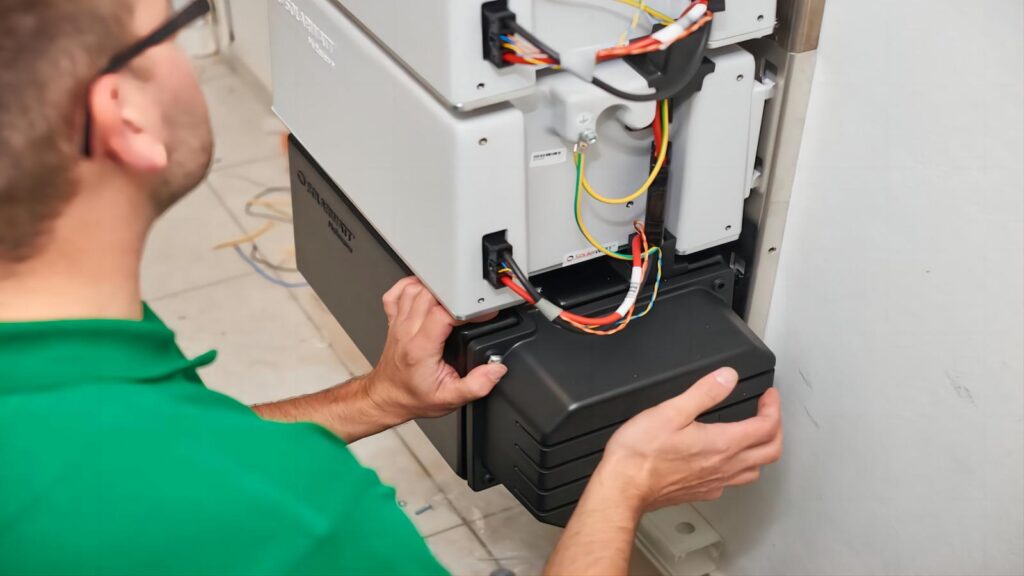
What are the advantages of home solar energy storage system?
- Improve self-sufficiency: PV home energy storage systems can improve a family’s self-sufficiency and reduce dependence on traditional energy sources by effectively storing renewable energy sources such as solar and wind.
- Reducing energy costs: PV home energy storage systems can store solar energy generated during the day and use it at night or in the dark, reducing reliance on the power grid and lowering energy costs for families.
- Improve environmental quality: home solar energy storage systems can promote the use of renewable energy and reduce the consumption of fossil energy, thus improving environmental quality.
- Safe and reliable: home solar energy storage systemadopts high-quality lithium-ion batteries and other components, with excellent safety and reliability.
- Strong scalability: home solar energy storage systemcan be expanded or upgraded according to the actual power demand of the family, realizing flexible system adjustment.
- Convenient operation: the home solar energy storage systemhas a friendly man-machine interface and intelligent control function, which can realize remote monitoring and control, and easy and convenient operation.
Maysun Solar has a wide variety of shingled, half-cut and black frame, all black, silver frame solar panels to choose from, which have excellent performance and stylish design to blend in perfectly with any building.Maysun Solar has successfully established offices, warehouses, and long term relationships with excellent installers in many countries! We will install the most convenient solar panels for you and take care of your future cleaning and maintenance. Please feel free to contact us for an up-to-date quote on modules or any PV-related inquiries.
Reference:
OFweek (2023) How to configure energy storage batteries in household energy storage systems?
https://chuneng.ofweek.com/news/2023-08/ART-180225-8120-30605404.html
OFweek (2023)What are the uses of household energy storage systems? What are the characteristics and applications of household energy storage systems?
https://chuneng.ofweek.com/news/2023-04/ART-180226-11000-30592680.html
OFweek(2023)What are the uses of household energy storage systems, and what are their characteristics and applications?
https://chuneng.ofweek.com/news/2023-04/ART-180226-11000-30592806.html
OFweek (2023)Introduction to the types and characteristics of common household energy storage systems
https://chuneng.ofweek.com/news/2023-03/ART-180226-11000-30590435.html
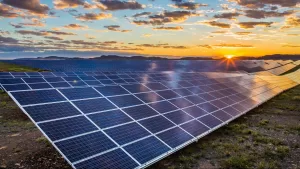
New Photovoltaic news you should know about (March 2024)
Table of Contents REC Unveils a 430 W Heterojunction Solar Module Boasting 22.2% Efficiency REC, a Singapore-based PV module manufacturer, introduces its residential solar modules featuring Alpha heterojunction cell technology. Production has commenced at REC’s Industry 4.0 fab in Singapore, with initial shipments
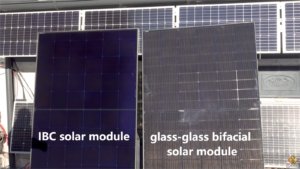
IBC Solar Modules vs. Bifacial Glass-Glass Solar Modules: Which Is More Suitable for Winter or Low-Light Conditions?
Table of Contents Introduction As the demand for renewable energy continues to surge, advancements in solar technology have broadened the spectrum of component choices available to us. Among these, IBC (Interdigitated Back Contact) full black solar modules have garnered special attention due to

Why Are Lightweight Bifacial Solar Panels the Best Choice for Balcony Solar Power Plants?
Table of Contents In the quest for efficient and eco-friendly home energy solutions, solar photovoltaic technology has emerged as a key player due to its sustainability and clean energy benefits. Particularly in the space-constrained urban settings, the effective conversion of every inch of
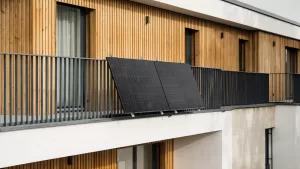
Questions You Might Ask About Balcony Solar Power Plants in 2024
Table of Contents What is a Balcony Solar Power Plant? Similar to a traditional photovoltaic panel, a Balcony Solar Power Plant is a device designed to generate electricity from solar energy. This green energy generator is specifically tailored for self-consumption, but it comes with
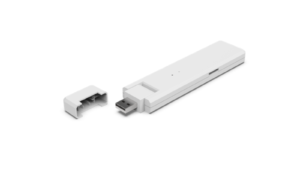
A Step-by-Step DTU Guide for Balcony Solar Power Plants
As renewable energy becomes increasingly integral in our daily lives, Maysun Solar’s Balcony Solar Power Station, with its advanced technology and user-friendly design, represents a transformative approach to home solar solutions. The integration of a Data Transfer Unit (DTU) enhances its smart functionality
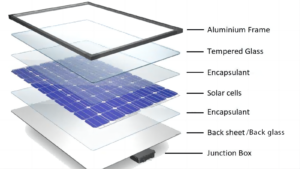
What Are The Main Components of Solar Panels?
What are the main components of solar panel? Solar panels, the cornerstone of solar energy technology, are composed of several integral parts, each contributing to their ability to harness sunlight and convert it into electrical energy. In this article, we will explore the essential
